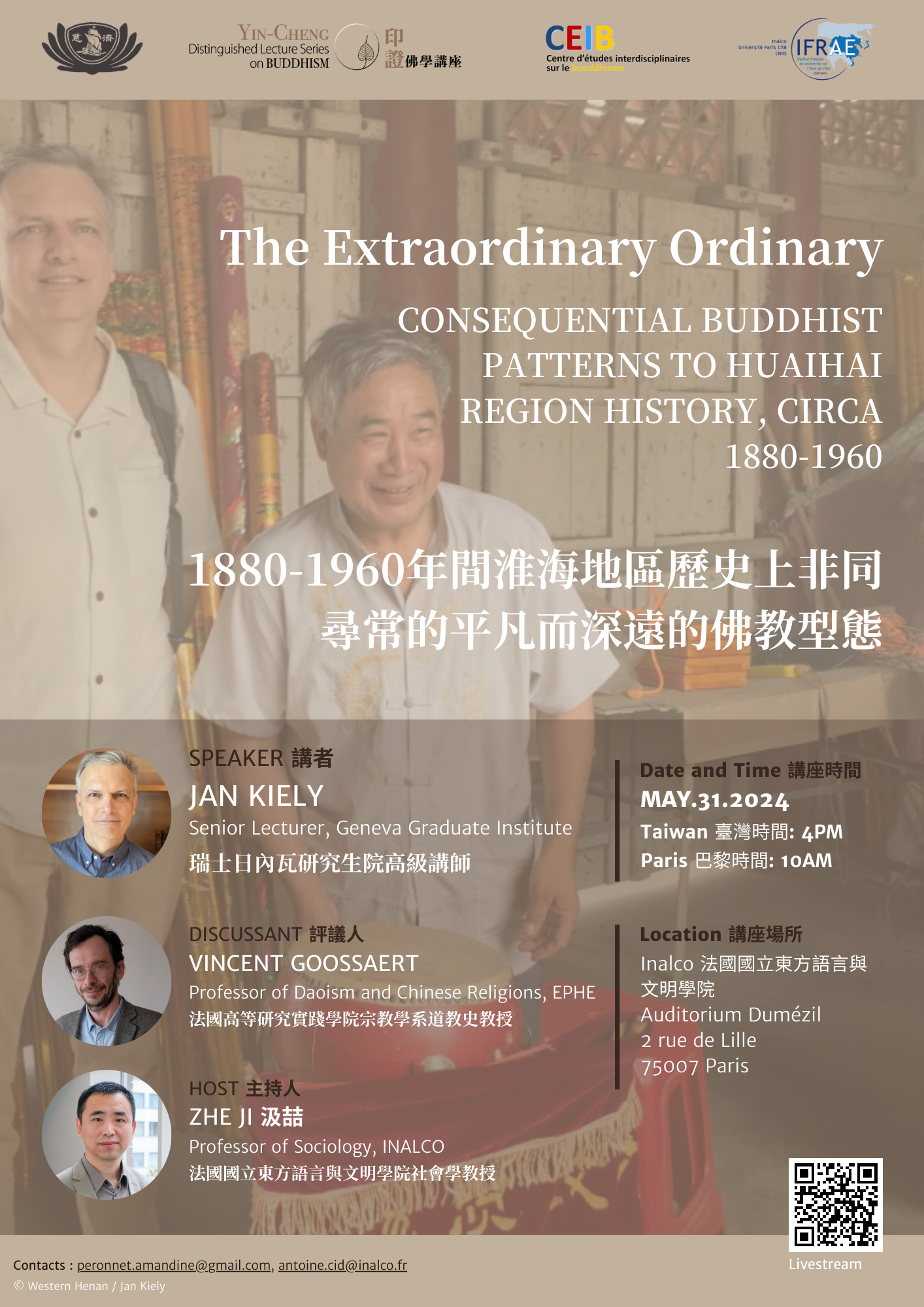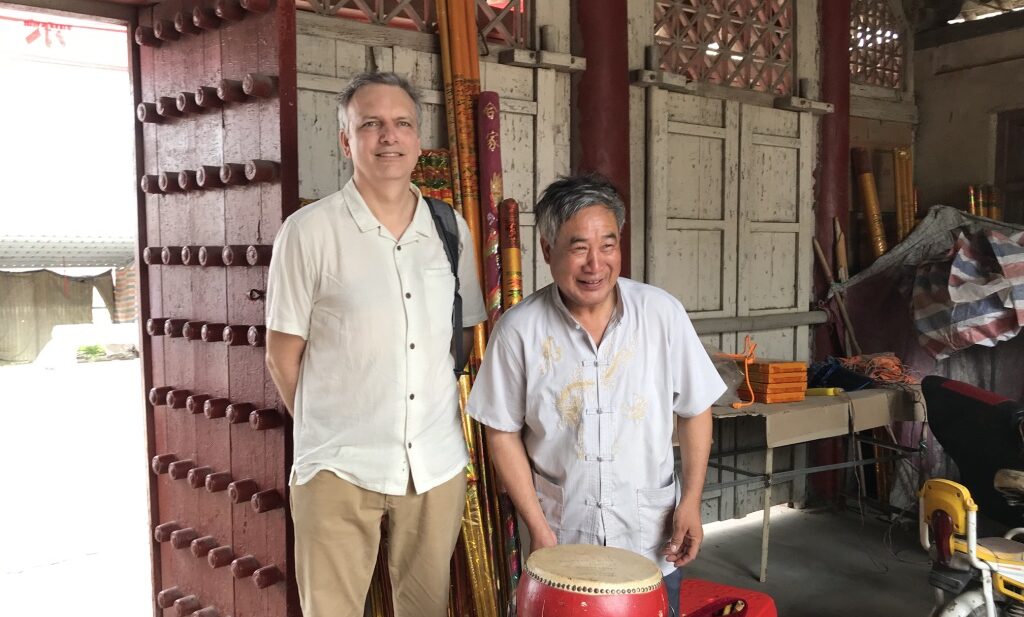Dans le cadre de son cycle de conférences “Mapping Networks of Modern Chinese Buddhism: Emerging Patterns and Centralities” 圖繪近現代漢傳佛教網絡:多模式與多中心的興起, le CEIB accueillera Jan Kiely (Geneva Graduate Institute) le vendredi 31 mai 2024. Il donnera la “Yin-Cheng Distinguished lecture” annuelle en anglais, une conférence intitulée “The Extraordinary Ordinary, Consequential Buddhist Patterns to Huaihai Region History, circa 1880-1960”.
Informations pratiques
Titre / Title : The Extraordinary Ordinary, Consequential Buddhist Patterns to Huaihai Region History, circa 1880-1960 / 1880-1960年間淮海地區歷史上非同尋常的平凡而深遠的佛教型態
Conférencier / Lecturer : Jan Kiely (Geneva Graduate Institute)
Discutant / Discussant : Vincent Goossaert (EPHE)
Financement / Funding : Buddhist Compassion Relief Tzu Chi Foundation
Date et heure / Date and Time : le vendredi 31 mai de 10h à 12h30 / May 31, 10 AM (Paris)
Lieu / Location : Auditorium Dumézil, Maison de la Recherche, 2 rue de Lille, 75007 Paris
Lien de connexion / link : Livestream
Organisation : Amandine Péronnet, Antoine Cid

Résumé / Abstract
If touching on the Buddhist network modes suggested by Welch, this paper primarily concerns patterns of discernibly Buddhist social-cultural practices, performances, and representations of consequence to local-regional histories of the end of the imperial era and the rise of the Chinese nation-state. It is not an attempt to tell a Buddhist or religious history, but recognizes, within a “six-teachings-in-one” (Buddhist-Confucian-Daoist-local religion-Wu-ist-secularist) social-culture, distinctive Chinese Buddhist elements significant to the processes and leavening dynamics of local and regional history in these turbulent times. Shifting the focus away from the well-known Jiangnan metro-area and toward its peripheral and largely abstracted northern antithesis – Jiangbei/Subei, the analysis is situated in a culturally coherent-enough subregion once known as Huaihai. Drawn mostly from non-Buddhist and non-religious sources and some fieldwork, the findings fit comfortably neither with Welch’s supposition of a predominant northern Jiangsu Buddhism nor with common postulations of a withered Buddhism, indistinct in the mélange of a “backward” culture. Many of the patterns discussed may seem hardly surprising, even ordinary. Yet, reflecting on stories of Buddhist monks, nuns, lay women and men, as well as those of people and places that might be considered even more “impure” in their relationship to Buddhism, the study detects Buddhist social-cultural resources extraordinary in their contributions to shaping and revealing historical change in this setting.
從韋爾奇 (Welch)提出的佛教網絡模式出發,本文著重探討在皇帝時代結束和中國民族國家崛起之際佛教中顯見的社會文化實踐、表演和表述模式對地方區域史的影響。本文並非試圖講述一段佛教史或宗教史,而是希望在“六教合一”(佛教-儒教-道教-地方宗教-巫教-世俗主義)的社會文化中闡釋中國佛教特有元素對這一動蕩時代地方區域的歷史進程的重要意義。本研究把關注點從眾所周知的江南核心區域轉移到其外圍、很大程度上被抽象化的對立面即所謂的“江北/蘇北“,深入研究一個在文化上具有足夠連貫性、曾被稱為淮海的區域。基於非佛教、非宗教的史料及田野調查,本文研究結果並不支持韋爾奇關於蘇北佛教佔主導地位的假設,也不認同關於佛教在“落後”文化中凋零、模糊不清的常見說法。所討論的許多模式似乎並不令人驚訝,甚至很普通。通過反思那些關於佛教僧尼、居士以及那些在與佛教的關係上可能被認為更“不純粹”的人和地方的故事,本研究挖掘出佛教所提供的社會文化資源在塑造和顯露這一歷史變化中所具有的非凡意義。
| Jan Kiely is Senior Lecturer in the Department of International History and Politics at the Geneva Graduate Institute. He was formerly Professor and Director of the Center for China Studies at the Chinese University of Hong Kong and Co-Director and Associate Professor at the Johns Hopkins University-Nanjing University Center for Chinese and American Studies. He is the author of The Compelling Ideal: Thought Reform and the Prison in China, 1901-1956, and of a number of articles, including studies of Buddhists in modern Chinese history. Kiely is co-editor of Modern Chinese Religion II: 1850-2015, Recovering Buddhism in Modern China, and Fieldwork in Modern Chinese History: A Research Guide, and was an editor for the journal Twentieth Century China. He received his Ph.D. in History from the University of California at Berkeley. 楊凱里博士現任瑞士日內瓦研究生院國際歷史與政治系高級講師。 他曾任香港中文大學歷史學教授兼中國研究中心主任、約翰霍普金斯大學-南京大學中美研究中心聯合主任兼副教授。他著有《緊迫的典範: 中國1901-1956 年間的思想改造與監獄》、多篇關於中國近代史佛教徒的論文,以及即將出版的專著《亂世寶地: 1890-1930 年代淮海農村的邊緣化與韌性。楊凱里博士主編了《中國近代宗教 II: 1850-2015》、《現代中國重見佛教》和《中國近代史中的田野研究:研究指南》,也是學術期刊《二十世紀中國》編委之一。他在加州大學伯克利分校獲得歷史學博士學位。 |
| Vincent Goossaert (PhD, EPHE, Paris, 1997) is Professor of Daoism and Chinese religions at EPHE, PSL. He is co-editor of T’oung Pao, a leading journal in sinology established in 1890. His research deals with the social history of Chinese religion in late imperial and modern times, especially Daoism, religious professions, socio-religious regulations, productions of moral norms, and human-divine sociability. He has published about twenty books, including Making the Gods Speak. The Ritual Production of Revelation in Chinese History (Harvard University Asia Center, 2022), Heavenly Masters. Two Thousand Years of the Daoist State (University of Hawai’i Press; Chinese University Press, 2021), Vies des saints exorcistes. Hagiographies taoïstes, 11 e -16 e siècles (Paris, Les Belles Lettres, 2021), and Bureaucratie et salut. Devenir un dieu en Chine (Geneva, Labor et fides, 2017). 高萬桑(Vincent Goossaert),1969年生于法國。1997年,在法國高等研究實踐學院(EPHE)獲得宗教學博士學位,論文題為《近代道教的建立—全真道》;次年成為法國國家科研中心專職研究員; 2012年,升EPHE宗教學系道教史教授。2017年當《通報》編輯。 |

Laisser un commentaire